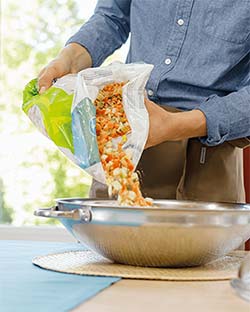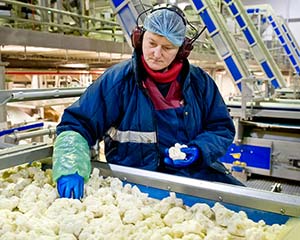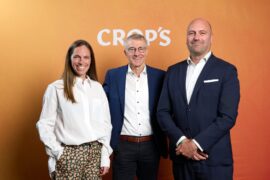An adverse one-two-three punch of bad weather, costly product recalls and heightened market pressure negatively impacted the first-half 2018-19 financial performance of Sint-Katelijne-Waver, Belgium-headquartered Greenyard, which reported results on November 20.
Net sales for the vegetable and fruit product specialist declined 3.6% to €1,982.8 million – down 3.5% in the fresh sector to €1,647.9 million, which was primarily attributed to volume losses from competitive pressure and pricing as a result of summer drought conditions.
 The long fresh sector (which includes Pinguin frozen, Noliko canned and prepared vegetable products) took a 4.1% hit as sales slid to €334.9 million. This was reportedly because of the discontinuation of certain non-profitable contracts and the delay of orders for prepared products, but also due to the loss of business following the Listeria-related recall in Greenyard’s frozen division.
The long fresh sector (which includes Pinguin frozen, Noliko canned and prepared vegetable products) took a 4.1% hit as sales slid to €334.9 million. This was reportedly because of the discontinuation of certain non-profitable contracts and the delay of orders for prepared products, but also due to the loss of business following the Listeria-related recall in Greenyard’s frozen division.
The company incurred a net non-recurring cost of €22.6 million and a recurring cost of €3.5 million related to the recall and destruction of frozen vegetables from its Hungarian processing plant, and other related consequences thereof.
REBITA declined by 39.9% to €41.2 million (excluding discontinued operations).
Addressing investors during an online conference call, Greenyard CEO Hein Deprez commented:
“Our results reflect the fierce competition and difficult market circumstances in our key markets. Consolidation in these markets puts pressure on all suppliers to find ways to deliver their products, even at low prices. The current challenging market conditions have also led us to take certain decisive actions, such as the sale of our horticulture segment, which was needed to strengthen our balance sheet again. We will use these proceeds to repay the retail bond that is due in July 2019. We continue to work hard to further strengthen our company and are fully focused on further internal growth.”
He continued: “Despite this hard market reality, we continue to believe in our strategy to form partnerships with our retailers by working closely and transparently together with them to rationalize the entire supply chain to the benefit of all – consumers, retailers, growers and Greenyard.
“We already see good examples and stable growth for those retailers and Greenyard, where we are able to build such partnership model. We will do that in the current combination of our fresh and long fresh segments as a unique player in the market offering all categories in fruit and vegetables in all its forms – fresh, frozen and prepared. We are convinced we have the right people, heart, assets and strategy to defend our market position, grow our base and build these partnerships for the future.”
For 2018-19, Greenyard maintains its guidance of REBITDA -25% versus last year, excluding currency impact.
Focus on a Healthier Future
Following up on the earnings report, the company held a Capital Markets Day in Mechelen, Belgium, on November 21, hosted by CEO Deprez as well as COO Carl Peeters and CFO Geert Peeters. Entitled “Focus on a Healthier Future,” the program served up a series of presentations including plans and strategies to enhance the company’s positions in various market segments.
 Agenda items included a review of how Greenyard is moving towards partnerships with retailers that have already led to an increase in market share with the top 10 customers from 6.7% in 2015 to 7.1% in 2018. Also discussed was a forecast by analysts maintaining that Greenyard is likely to generate a compounded annual growth rate of 18.4% in REBITDA until March of 2021.
Agenda items included a review of how Greenyard is moving towards partnerships with retailers that have already led to an increase in market share with the top 10 customers from 6.7% in 2015 to 7.1% in 2018. Also discussed was a forecast by analysts maintaining that Greenyard is likely to generate a compounded annual growth rate of 18.4% in REBITDA until March of 2021.
Meanwhile, the company’s shares closed down 4% at €7.68 on the Euronext Brussels Exchange on Tuesday. A year ago, on November 22, 2017, the stock was quoted at €21.01.





